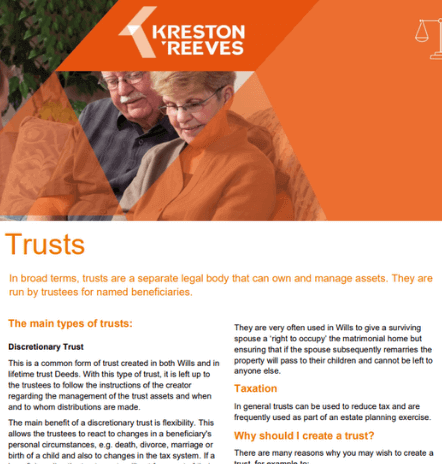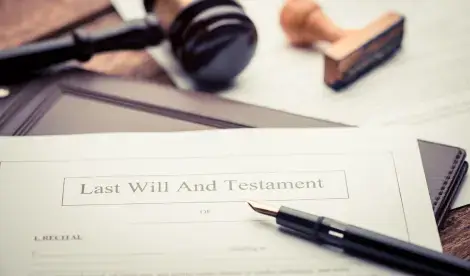What is a trust?
In broad terms, trusts are a separate legal body that can own and manage assets. They are run by trustees for named beneficiaries.
The main types of trust are:
Discretionary Trust
A common form of trust created in both Wills and in lifetime trust Deeds. With this type of trust, it is left up to the trustees to follow the instructions of the creator regarding the management of the trust assets and when and to whom distributions are made.
The main benefit of a discretionary trust is flexibility. Your trustees can best achieve your wishes based on the circumstances at the time, and a beneficiary is not entitled to trust assets unless the trustees agree to it. So, for example, if a beneficiary dies the trust assets will not form part of their estate for tax purposes and will not pass to the beneficiaries of his/her Will. Trust assets are also much less likely to be considered on a separation or divorce.
Absolute trust
The simplest form of trust currently available. The assets belong outright to the beneficiaries but are managed by trustees on their behalf.
Life Interest Trust
These provide for a specific person to receive benefits for their lifetime or a specified period (until they remarry for example). The benefit can include a right to live in a property and/or a right to receive income (in the form of interest, dividends, rents etc). The capital in this type of trust is not usually available for the beneficiary to spend. They are very often used in Wills to give a surviving spouse a ‘right to occupy’ the matrimonial home but ensuring that if they remarry the property still passes to their children when they die.
Taxation
Trusts can be subject to income tax, capital gains tax and inheritance tax. These taxes may arise on various events such as when assets are first put into trust, during the lifetime of the trust, on income generated by trust assets or when assets are sold or leave the trust.
Why should I create a trust?
There are many reasons why you may wish to create a trust, for example:
- To securely pass on assets to future generations
- To retain control over assets you wish to give away and control and limit who can inherit from you
- Provide for vulnerable or disabled beneficiaries
- Mitigate tax
- Provide for children and partners from different relationships
- Protect entitlements to means tested benefits
- Minimise or eliminate the risk of assets being attacked on insolvency/bankruptcy or divorce
- Set out joint property ownership arrangements
How is a trust created?
A trust is created by a Will if it to come into effect after death or while a person is alive by a trust Deed or a Deed of Variation.
To be valid, a trust will usually set out:
- who is creating the trust (the Settlor)
- the rules of how the trust is to be managed
- what type of trust is being created
- what assets are going into the trust
- whether other assets can be added later
- who is going to manage and administer the trust (the Trustees)
- who can benefits from the trust (the Beneficiaries) and when
Every trust is subject to ‘trust laws’ i.e. laws that regulate what trustees and trusts can do. The terms of the trust Deed or Will are therefore very important and need to be carefully drafted by experts.
What assets can a trust hold?
There are very few exceptions to the assets a trust can own, and trust assets typically include land, property, cash, shares, bonds, possessions, life policies and pensions.
When a lifetime trust is created, the Settlor will decide what assets are to be ‘settled’ or put into the trust. Ownership will be changed by a legal transfer from the Settlor to the trustees. For cash, the trustees will usually open a bank account. For a Will Trust special provisions must be included in the Will.
Related resources
This site is protected by reCAPTCHA and the Google Privacy Policy and Terms of Service apply.
PDF 247k Trusts registration service
This site is protected by reCAPTCHA and the Google Privacy Policy and Terms of Service apply.
Related news and insights
Subscribe to our newsletters
Our complimentary newsletters and event invitations are designed to provide you with regular updates, insight and guidance.
You can unsubscribe from our email communications at any time by emailing [email protected] or by clicking the 'unsubscribe' link found on all our email newsletters and event invitations.
This site is protected by reCAPTCHA and the Google Privacy Policy and Terms of Service apply.















